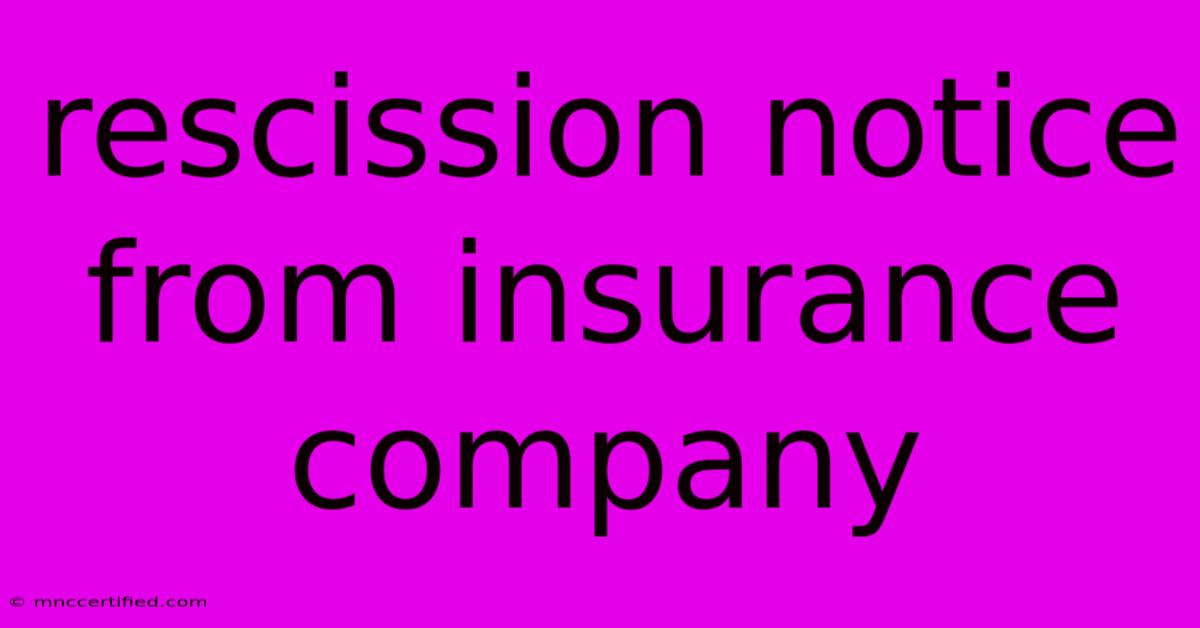Rescission Notice From Insurance Company

Table of Contents
What is a Rescission Notice from an Insurance Company?
A rescission notice is a formal document issued by an insurance company that cancels your insurance policy retroactively. This means that your policy is deemed invalid from the date it was issued, and you are not entitled to any coverage for any incidents that occurred during the policy period.
Imagine this: You've been paying your insurance premiums diligently for months. Then, out of the blue, you receive a notice from your insurance company stating that your policy is being rescinded. The news can be shocking and confusing.
But why would an insurance company rescind a policy?
Reasons for Insurance Policy Rescission
There are several reasons why an insurance company might choose to rescind a policy, but the most common include:
1. Misrepresentation or Fraud on the Application:
- Lying about your driving history: If you falsely claimed a clean driving record to get a lower premium, the insurance company may rescind your policy.
- Hiding a pre-existing medical condition: If you failed to disclose a pre-existing medical condition that could impact your health insurance, the company may consider your policy void.
- Providing false information about your property: If you misrepresented the value of your home or vehicle to get a lower premium, the insurance company could rescind your policy.
2. Material Misrepresentation:
- Omitting crucial information: Even unintentional omissions on the application can lead to rescission. If a piece of information significantly affects the insurance company's risk assessment, it could be considered a material misrepresentation.
3. Non-Disclosure:
- Failing to mention relevant information: This is similar to misrepresentation but focuses on information that was not specifically asked for on the application but was still important to disclose.
4. Non-Payment of Premiums:
- Failure to make payments on time: While this doesn't always result in rescission, chronic non-payment can lead to cancellation, rendering your policy invalid.
What Happens After You Receive a Rescission Notice?
If you receive a rescission notice, it is crucial to understand your rights and options.
1. Review the Notice Carefully:
- Understand the reason: Carefully read the notice to identify the specific reason for rescission.
- Seek legal advice: Consult with an experienced insurance lawyer to understand your rights and options.
2. Consider Appealing the Decision:
- Gather evidence: If you believe the rescission is unjustified, collect any evidence to support your case, such as documentation related to the information in question.
- Contact the insurance company: Attempt to negotiate with the insurance company to overturn the decision.
3. File a Complaint:
- State regulatory bodies: If the insurance company refuses to budge, consider filing a complaint with your state's insurance regulatory body.
- Legal action: In some cases, you may need to consider legal action to fight the rescission.
Tips to Avoid a Rescission Notice
- Be truthful on your application: Provide accurate information about your driving history, medical conditions, and property details.
- Read the fine print: Thoroughly review your policy documents and understand the terms and conditions.
- Pay your premiums on time: This helps maintain a good relationship with your insurance company.
- Consult an insurance broker: A broker can help you choose the right policy and ensure you understand your coverage.
Remember: Insurance companies have the right to rescind policies if they believe there was misrepresentation or fraud during the application process. By being honest and transparent, you can minimize the risk of facing this situation.

Thank you for visiting our website wich cover about Rescission Notice From Insurance Company. We hope the information provided has been useful to you. Feel free to contact us if you have any questions or need further assistance. See you next time and dont miss to bookmark.
Featured Posts
-
Europa League Man Utd Vs Paok Live Stream
Nov 08, 2024
-
Man Utd Vs Paok Live Goal Updates
Nov 08, 2024
-
Waiver Of Subrogation Property Insurance
Nov 08, 2024
-
Robins Out Coventry Citys Managerial Change
Nov 08, 2024
-
Colonial Accident Insurance Payout Chart
Nov 08, 2024